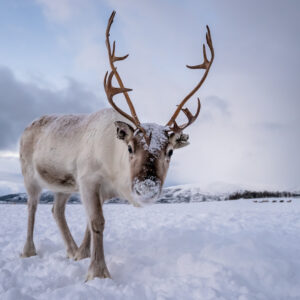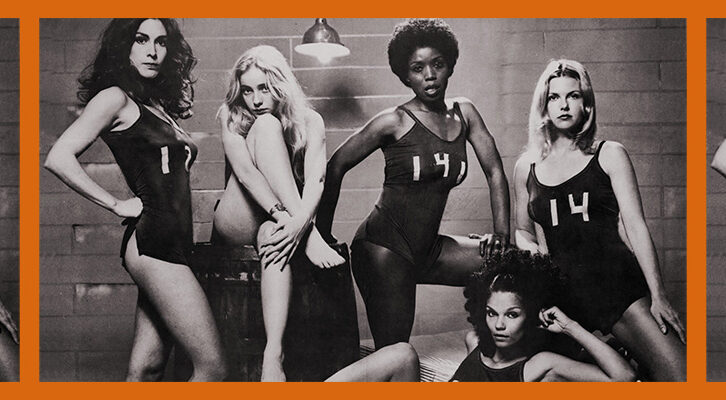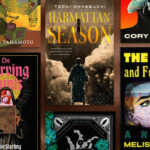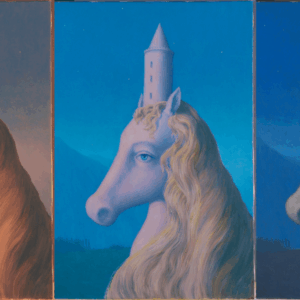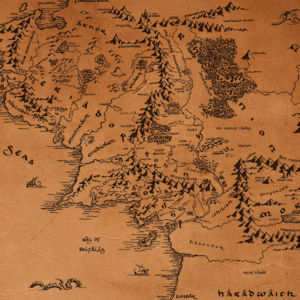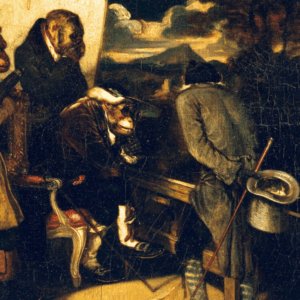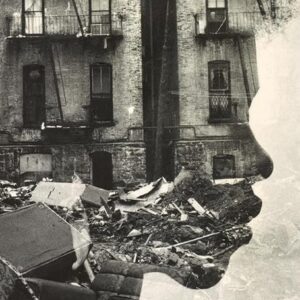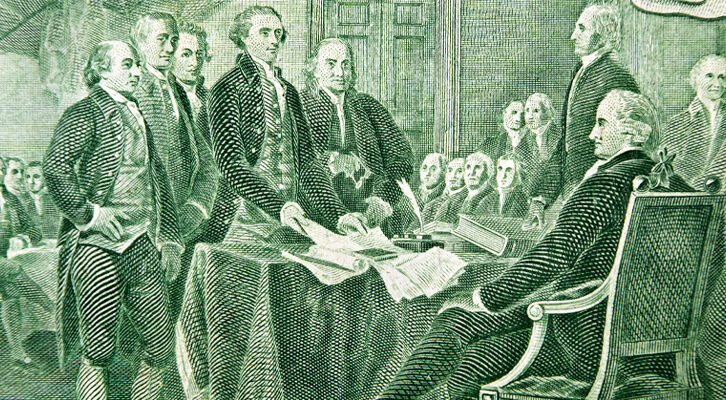
A Brief Survey of the Great American Novel(s)
Do We Need The G.A.N.? Why Do We Keep Looking?
On this date in 1868, novelist John William DeForest coined the now inescapable term “the great American novel” in the title of an essay in The Nation. Now, don’t forget that in 1868, just a few years after the end of the Civil War, “America” was still an uncertain concept for many—though actually, in 2017 we might assert the same thing, which should give you a hint as to why the term “great American novel” is so problematic.
At the time of his writing, DeForest claimed that the Great American Novel, which he defined as “the picture of the ordinary emotions and manners of American existence,” had not yet been achieved, though he thought he could spot it on the horizon—he noted that Uncle Tom’s Cabin was “the nearest approach to the desired phenomenon.” (He also pooh-poohed both Hawthorne’s The Scarlet Letter and Cooper’s The Last of the Mohicans, which is why, though others have dubbed them GANs, they don’t appear below.)
In the nearly 150 years since the essay was written, the argument over the Great American Novel—what it is, what it should be, do we have one, do we need one, why so many white men—has gone on and on. As A.O. Scott memorably put it, “the Great American Novel, while also a hybrid (crossbred of romance and reportage, high philosophy and low gossip, wishful thinking and hard-nosed skepticism), may be more like the yeti or the Loch Ness monster—or Sasquatch, if we want to keep things homegrown. It is, in other words, a creature that quite a few people—not all of them certifiably crazy, some of them bearing impressive documentation—claim to have seen.” Indeed, many, many books have been sighted—er, called—the Great American Novel, or at least one of them, or at least a great American novel, which is a decidedly different thing. Which ones? Who said it? Does it matter? Is this map accurate? Read on.
NB* There is no way to actually catalogue every single book that has ever been called a Great American Novel anywhere. This list compiles many of the books often cited as such, accompanied by a quote from a reputable source.
THE CONTENDERS
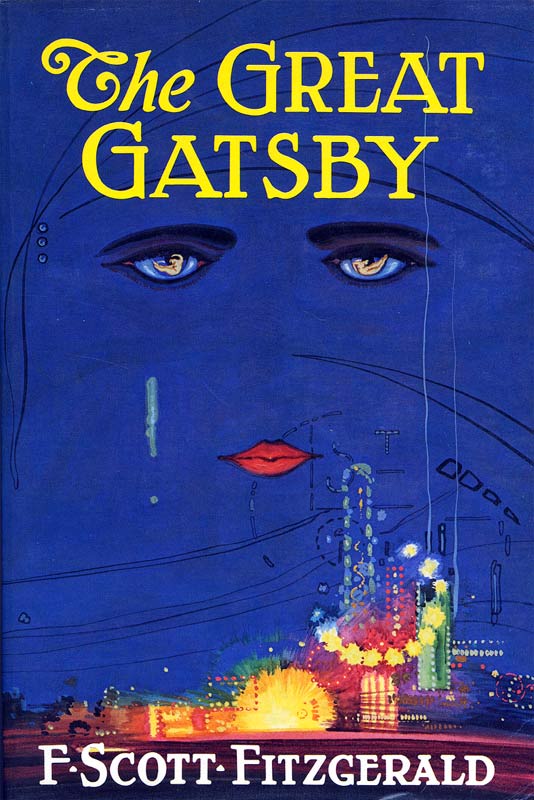
F. Scott Fitzgerald, The Great Gatsby
Gatsby’s magic emanates not only from its powerhouse poetic style—in which ordinary American language becomes unearthly—but from the authority with which it nails who we want to be as Americans. Not who we are; who we want to be. It’s that wanting that runs through every page of Gatsby, making it our Greatest American Novel. But it’s also our easiest Great American Novel to underrate: too short; too tempting to misread as just a love story gone wrong; too mired in the Roaring Twenties and all that jazz.
–Maureen Corrigan, So We Read On: How The Great Gatsby Came to Be and Why It Endures, 2014
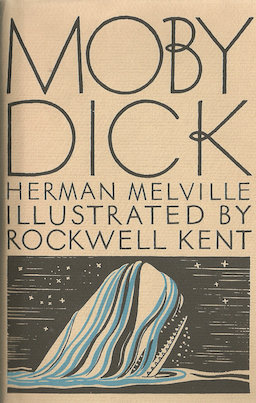
Herman Melville, Moby-Dick
Among all Great American Novel candidates, perhaps Moby-Dick (1851) best meets Nobel laureate J.M. Coetzee’s test. [“As long as the classic needs to be protected from attack, it can never prove itself classic.”] At least for now, the case for Moby-Dick seems to need least defense. … Moby-Dick‘s dissemination as text, and its fertility as object of imitation, as icon, as logo, as metaphor, have no more stopped at the nation’s borders than the Pequod did.
–Lawrence Buell, The Dream of the Great American Novel, 2014
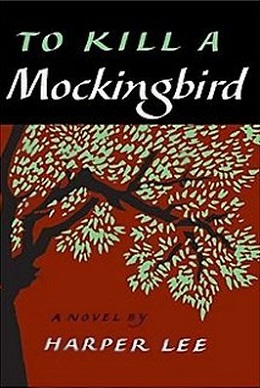
Harper Lee, To Kill a Mockingbird
[T]he Great American Novel is a moving target and that the space is filled by a novel that in any particular time best fulfills three main criteria:
Ubiquity: It has to be a novel that a relatively large number of Americans have read, and that a large proportion of those who haven’t read it know about in other ways (for example, by a popular filmed adaptation).
Notability: There has to be a general agreement that the novel is significant—it has literary quality and/or is part of the cultural landscape in a way that’s unquestionable (even if critically assailable).
Morality: It needs to address some unique aspect of the American experience, usually either our faults or our aspirations as a nation, with recognizable moral force (not to be confused with a happy ending).
…
Which is why, right now, the Great American Novel is To Kill a Mockingbird by Harper Lee, with F. Scott Fitzgerald’s The Great Gatsby and The Scarlet Letter by Nathaniel Hawthorne as runners-up. Are these the best American novels? That’s subjective (I vote no), but they were on the reading list when I was in high school, and now, 30 years on, when my daughter is. They are a common American experience—one of the few we still have.
–John Scalzi, Los Angeles Times, 2016
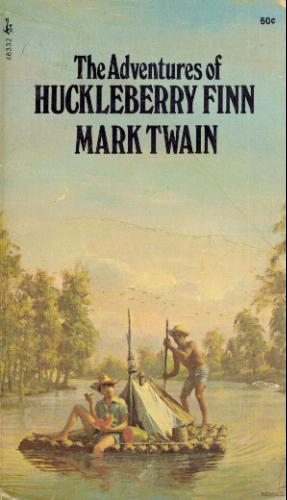
Mark Twain, The Adventures of Huckleberry Finn
There was no sense [upon its publication] that a great American novel had landed on the literary world of 1885. The critical climate could hardly anticipate T. S. Eliot and Ernest Hemingway’s encomiums 50 years later. In the preface to an English edition, Eliot would speak of “a master piece. … Twain’s genius is completely realized,” and Ernest went further. In “Green Hills of Africa,” after disposing of Emerson, Hawthorne and Thoreau, and paying off Henry James and Stephen Crane with a friendly nod, he proceeded to declare, “All modern American literature comes from one book by Mark Twain called Huckleberry Finn. … It’s the best book we’ve had. All American writing comes from that. There was nothing before. There has been nothing as good since.” … What else is greatness but the indestructible wealth it leaves in the mind’s recollection after hope has soured and passions are spent? It is always the hope of democracy that our wealth will be there to spend again, and the ongoing treasure of Huckleberry Finn is that it frees us to think of democracy and its sublime, terrifying premise: let the passions and cupidities and dreams and kinks and ideals and greed and hopes and foul corruptions of all men and women have their day and the world will still be better off, for there is more good than bad in the sum of us and our workings. Mark Twain, whole embodiment of that democratic human, understood the premise in every turn of his pen, and how he tested it, how he twisted and tantalized and tested it until we are weak all over again with our love for the idea.
–Norman Mailer, The New York Times, 1984
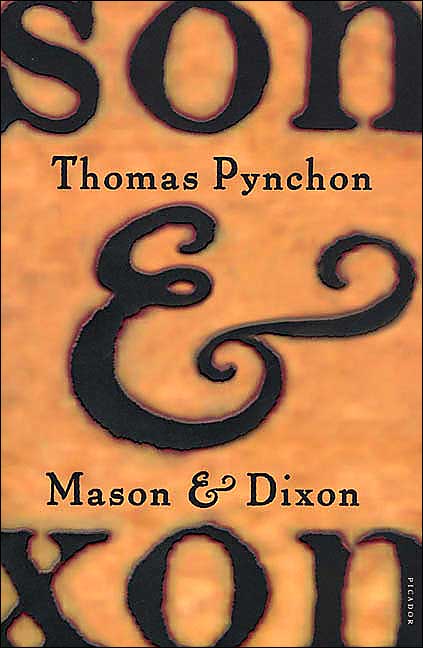
Thomas Pynchon, Mason & Dixon
Let’s make this a whole lot easier. After Twain and Fitzgerald, there’s Thomas Pynchon and there’s everybody else. When we ask about the Great American Novel, what we’re really asking is, which of Pynchon’s novels is the most American?… The author’s most obvious candidate for the Great American Novel would seem to be Mason & Dixon, a playfully archaic picaresque about the two 18th-century surveyors who drew the “geometrick Scar” along which, during the Civil War, America almost bled out. But the G.A.N. could just as easily be one of Pynchon’s other works, each of which rings a fresh variation on the same two questions: What happened to the country we wanted? And can its original promise ever be redeemed?
–David Kipen, Los Angeles Times, 2016
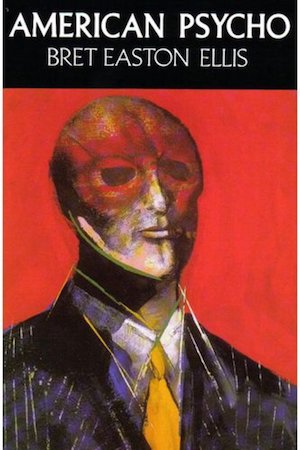
Bret Easton Ellis, American Psycho
With the glorious Fourth looming dead ahead, it’s an excellent time to play the home version of this game: What’s your pick for Great American Novel? Not the best novel written by an American. Rather, the best novel written by an American that most clearly reflects the spirit, character and destiny of America, both its good and bad sides, its mistakes and its triumphs. It’s more than a game, of course. Selecting a novel that encapsulates a nation’s soul is a sneaky means of interrogating your deep beliefs about the place, your prejudices and your expectations. … Still, for the purpose of being cantankerous and starting arguments with the many kind folks who e-mail me, I’m momentarily partial to the violent incantations of American Psycho. Reviled upon its initial publication for its gleeful gore, Ellis’s novel about an unrepentant serial killer strikes me these days as witty and knowing. It’s filled with brand names and sex and social anxiety, a triumvirate typically ignored by novels that focus only on a narrator’s interior journey. For this precious nanosecond, then, I’m going with American Psycho.
–Julia Keller, Chicago Tribune, 2007
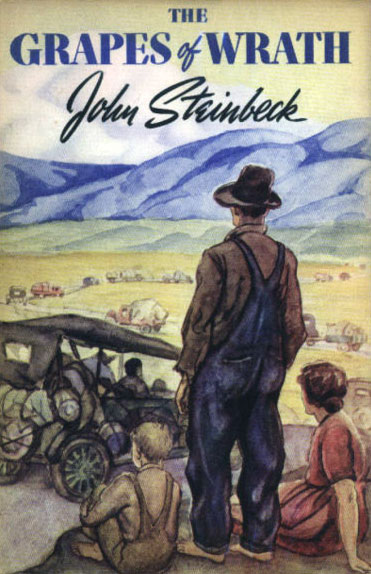
John Steinbeck, The Grapes of Wrath
Today marks the 69th anniversary of Steinbeck’s The Grapes of Wrath, which for my dime is the 20th century’s “Great American Novel.” Personally, I like Gatsby and For Whom the Bell Tolls better, but Gatsby is somewhat of an unbelievable character (he’s not the type of guy you’re ever likely to meet) and the Hemingway isn’t set in the US. Grapes is a distinctly American book relating a dark chapter in our history, and Tom Joad and Ma Joad, the all-time great mother character, are people you might meet. … Steinbeck captured the American nature of the real people, the hard-working, regular guys “just trying to get along without shoving anybody” as Tom says that Scott and Ernesto never did.
–Michael Rogers, Library Journal, 2008
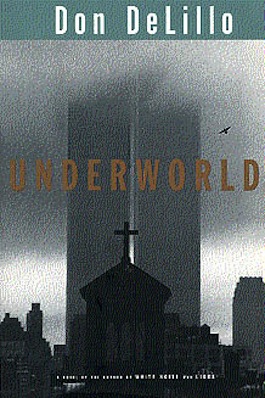
Don DeLillo, Underworld
From its first appearance in October 1997, a moment I remember well as the Observer’s literary editor, Underworld was spoken of as a towering performance and hailed as that elusive literary hippogriff, the great American novel. In his review, the novelist William Boyd wrote, “In Underworld, we have a mature and hugely accomplished novelist firing on all cylinders… reading the book is a charged and thrilling aesthetic experience and one remembers gratefully that this is what the novel can do.” The Observer also described it as “an epic to set alongside Moby-Dick and Augie March” (Nos 17 and 73 in this series). Such ideas were possibly reinforced by DeLillo’s quotable opening line: “He speaks in your voice, American, and there’s a shine in his eye that’s halfway hopeful.”
–Robert McCrum, The Guardian, 2015
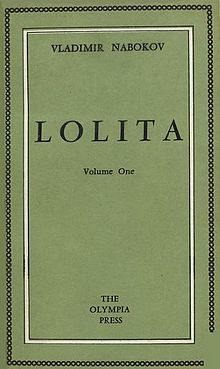
Vladimir Nabokov, Lolita
Some say the Great American Novel is Huckleberry Finn, some say it’s The Jungle, some say it’s The Great Gatsby. But my vote goes to the tale with the maximum lust, hypocrisy and obsession—the view of America that could only have come from an outsider—Nabokov’s Lolita. … What makes Lolita a work of greatness isn’t that its title has become ingrained in the vernacular, isn’t that was a generation ahead of America in fetishizing young girls. No, it is the writing, the way Nabokov bounces around in words like the English language is a toy trunk, the sly wit, the way it’s devastating and cynical and heartbreaking all at once. Poor old Dolly Haze might not have grown up very well, but Lolita forever remains a thing of timeless beauty.
–Mary Elizabeth Williams, Salon, 1996
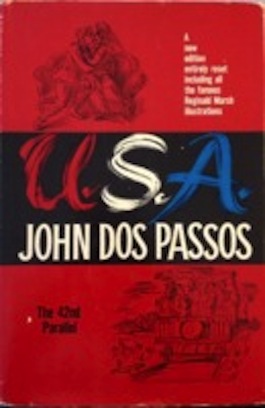
John Dos Passos, U.S.A.
The Great American Novel is no longer writable. We can’t do what John Dos Passos did. His trilogy on America came as close to the Great American Novel as anyone. You can’t cover all of America now. It’s too detailed. You couldn’t just stick someone in Tampa without knowing about Tampa. You couldn’t get away with it. People didn’t get upset if you were a little scanty on the details in the past. Now all the details get in the way of an expanse of a novel.
–Norman Mailer, Poynter, 2004
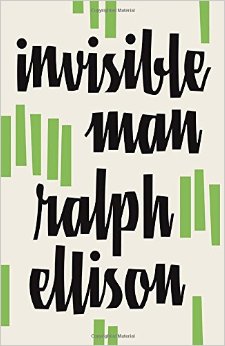
Ralph Ellison, Invisible Man
It is Invisible Man. No, it was not written by a Nobel Laureate or Pulitzer Prize winner, nor has it been around for centuries. It is a novel of substance, of layers and riffs. It might even be said to be the greatest American novel.
The greatness of Ralph Ellison’s Invisible Man (1952) comes from being many things to many readers. A racial epic. A bildungsroman in the form of a dramatic monologue. A rich psychological portrait of racial identity, racism, history, politics, manhood, and conflicted personal growth. An elusive story of and by an elusive, nameless narrator. A jazz-like play on literature, music, society, memory, and the self. A product of a voracious reader and writer. Somehow, it is all of these, perhaps one of the reasons it netted the National Book Award over The Old Man and the Sea and East of Eden.
–Joseph Fruscione, The Millions, 2013
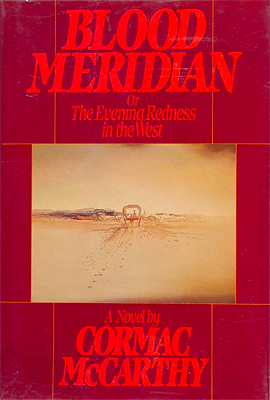
Cormac McCarthy, Blood Meridian
A great American novel can only be anti-American, and Blood Meridian, like Toni Morrison’s Beloved, focuses on our greatest shames, in this case our genocides and our desire for war, contemplating in its final chapters the slaughter of the buffalo; also the slaughter of innocence in the form of a dancing bear, and the slaughter of any would-be penitents, including the kid. The last look west has to see nowhere else to go.
–David Vann, The Guardian, 2009
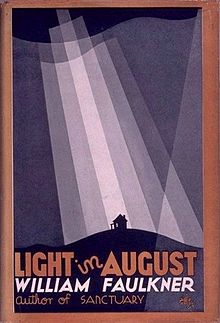
William Faulkner, Light in August
Light in August, published in 1932, is Faulkner’s Great American Novel. It was the seventh of what would be 19 novels, an output that was awarded the Nobel Prize in 1949 and that, to borrow a hackneyed but apt phrase, represents nothing less than an embarrassment of riches. A writer of prodigious powers, Faulkner bequeathed to readers a rich fictional panoply of complex characters, incisive social commentary, formal ingenuity, and metaphorical depth. His oeuvre displays an unsentimental compassion, a tragedian’s unblinking vision, and an almost preternatural insight into human motivation and desire. He left behind two highly influential masterpieces of modernist fiction: The Sound and the Fury and As I Lay Dying, works that, along with other modernist texts, radically altered conceptions of narrative linearity and the formal depiction of consciousness. Absalom, Absalom!, often mentioned in the same breath, is celebrated by many as his greatest, most fully realized novel, one of tremendous breadth and a radical consistency of aesthetics. But it is the less mannered Light in August, sometimes overlooked in discussions of his more overtly modernist works, that draws all of Faulkner’s familiar preoccupations—determinism vs. free will, the partially Reconstructed South, religiosity, the draw of female sexuality, and the power of the living past—around one overriding, ineradicably American concern: race.
–C.E. Morgan, The Daily Beast, 2012
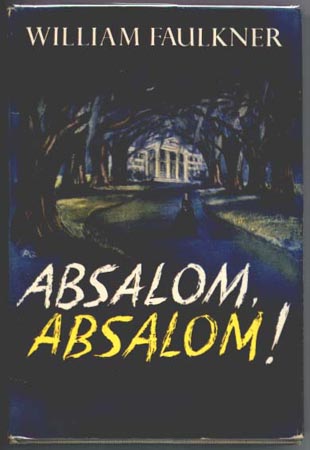
William Faulkner, Absalom, Absalom!
In January 1936, William Faulkner had just completed his latest novel and begun his latest drinking binge. He handed the new manuscript to a friend and said, “I want you to read this. … I think it’s the best novel yet written by an American.”
It sounded like the bourbon talking, but Faulkner was right. Still is. The fellow whom Faulkner had met while working for Warner Bros. held in his hands the world’s only copy of what would become—after some revision—Absalom, Absalom!, the publication of which should have by now settled the question of what is The Great American Novel. It is Faulkner’s ninth and best novel, Absalom, Absalom!
Novelist Frank Norris wrote in 1902 that The Great American Novel was pure myth, a hybrid creature that could never exist. He argued well, but too soon, years before the appearance of Absalom, which would have proved him wrong.
–Arthur Hirsch, The Baltimore Sun, 1997
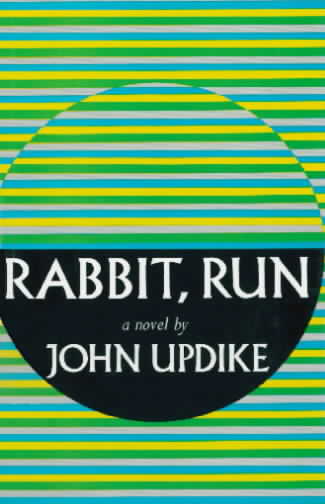
John Updike, Rabbit, Run
To consider the 1,700-odd pages of his Harry Angstrom saga—the bounding tetralogy of Rabbit books and their limping postscript—is to find yourself considering a work with an excellent claim as the Great American Novel, but you’d be forgiven for preferring to spend time with four or five Very Good ones.
–Troy Patterson, Slate, 2009
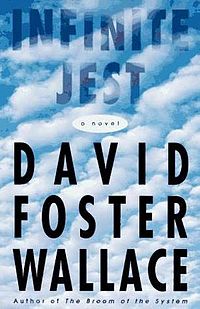
David Foster Wallace, Infinite Jest
It was in 1996 that Wallace arrived; I never saw anything quite like it before, and I do not expect to again. For some years there had already been murmurs and hints about the arrival of a massive new contender for Great American Novel, or at least Decade-Defining Doorstop; a huge, Pynchonesque, unsummarizable, labyrinthine, comic-tragic-ironic book about tennis and addiction that some math geek from Illinois had been brazen enough to call “Infinite Jest.” Books columnists talked about it like Ahab murmuring about the whale; one couldn’t help but be curious.
–Colby Cosh, National Post, 2008
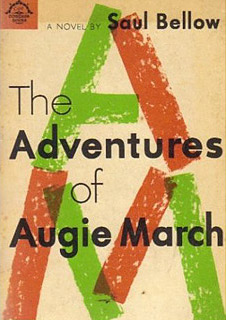
Saul Bellow, The Adventures of Augie March
The Adventures of Augie March is the Great American Novel. Search no further. All the trails went cold forty-two years ago. The quest did what quests very rarely do: it ended. … Augie March, finally, is the Great American Novel because of its fantastic inclusiveness, its pluralism, its qualmless promiscuity. In these pages the highest and lowest mingle and hobnob in the vast democracy of Bellow’s prose. Everything is in here, the crushed and the exalted, and all the notches in between, from the kitchen stiff… to the American eagle.
–Martin Amis, The Atlantic Monthly, 1995
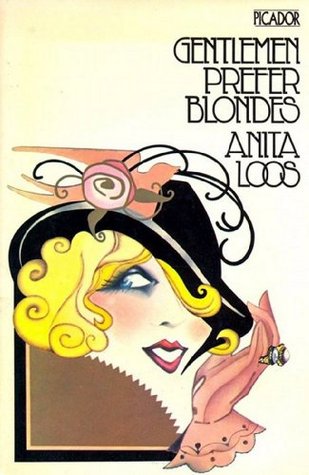
Anita Loos, Gentlemen Prefer Blondes
[I am] now reading the great American novel (at last!) and I want to know if there are—or will be—others and if you know the young woman [who wrote it], who must be a genius.
–Edith Wharton, “The Great American Novel,” Yale Review, 1927
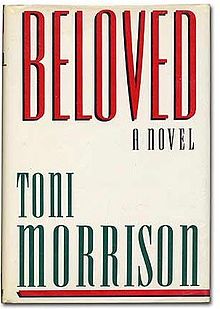
Toni Morrison, Beloved
When The New York Times Book Review asked 125 writers to name the best work of American fiction from the preceding 25 years (this was in 2006), Beloved came out on top.
“Any other outcome would have been startling, since Morrison’s novel has inserted itself into the American canon more completely than any of its potential rivals. With remarkable speed, Beloved has, less than 20 years after its publication, become a staple of the college literary curriculum, which is to say a classic. This triumph is commensurate with its ambition, since it was Morrison’s intention in writing it precisely to expand the range of classic American literature, to enter, as a living black woman, the company of dead white males like Faulkner, Melville, Hawthorne and Twain. When the book first began to be assigned in college classrooms, during an earlier and in retrospect much tamer phase of the culture wars, its inclusion on syllabuses was taken, by partisans and opponents alike, as a radical gesture. (The conservative canard one heard in those days was that left-wing professors were casting aside Shakespeare in favor of Morrison.) But the political rhetoric of the time obscured the essential conservatism of the novel, which aimed not to displace or overthrow its beloved precursors, but to complete and to some extent correct them.”
–A.O. Scott, The New York Times Book Review, 2006

Michael Chabon, The Amazing Adventures of Kavalier and Clay
I’m not sure what the exact definition of a “great American novel” is, but I’m pretty sure that Michael Chabon’s sprawling, idiosyncratic, and wrenching new book is one. Despite the flippant Marvel Comics title (this is, after all, a novel about comic books and their makers), The Amazing Adventures of Kavalier & Clay is preoccupied with vast and sober American themes: the meaning and mechanics of cultural assimilation, the search for moral and emotional identity in an indifferent world, the transformative role of popular entertainment in the lives of individuals and the nation itself. Oh, and did I mention love, death, guilt, and redemption? Yep—those too.
–Daniel Mendelsohn, New York Magazine, 2000
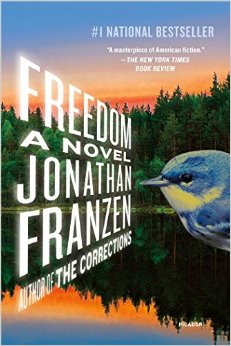
Jonathan Franzen, Freedom
(Franzen’s face on the TIME with the headline “Great American Novelist” could be credential enough, but just in case)
“The whole package, unashamedly generous of heft (it weighs in at over 550 pages) and heart, adds up to a rare pleasure, an irresistible invitation to binge-read, to devote the kind of time to a book that we tend more often these days to reserve only for work, sleep, or marathon viewing sessions of DVD box-sets. That it also grapples with a fundamental dilemma of modern middle-class America—namely: Is it really still OK to spend your life asserting your unalienable right to the pursuit of happiness, when the rest of the world is in such a state?—is what makes it something wonderful. If Freedom doesn’t qualify as a Great American Novel for our time, then I don’t know what would. … It is the first Great American Novel of the post-Obama era.”
–Benjamin Secher, The Telegraph, 2010
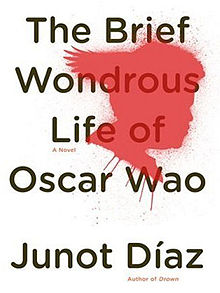
Junot Díaz, The Brief Wondrous Life of Oscar Wao
Six months before its official release in 2007, the galley arrived in my mailbox. I was on my way to Switzerland, so I almost passed on reviewing the book because of its length—I had promised myself I was going to dedicate my writing time in Europe to my own work. But on impulse I decided to accept the assignment, if anything, as an excuse to read the long-anticipated novel by the author of Drown. When I finally picked up the book, I knew I held something special in my hands. This was a book of the Américas. This was the Great Américas Novel.
I have come across enough conversations about “The Great American Novel” to understand that these don’t consider an author like Díaz, a book like The Brief Wondrous Life of Oscar Wao, whose immigrant journey travels vertically, not horizontally, whose cultural identity is cultivated by a pan-American consciousness. Book nerd Oscar de León moves through contemporary New Jersey, while his family history calls him from the Dominican Republic’s troubled past, and when the two narratives converge the quintessential 20th-century antihero is born.
The Great Américas Novel considers the big lives of those people American literature has marginalized. Even in the comic books and sci-fi stories that shape Oscar’s worldview the central characters are white, so he completes his identity and perspective with family lore—the multigenerational fukú curse, and all that footnoted content about the Dominican Republic’s Trujillo dictatorship that becomes relevant to the primary exposition as the narrative unfolds.
–Rigoberto González, Los Angeles Times, 2016
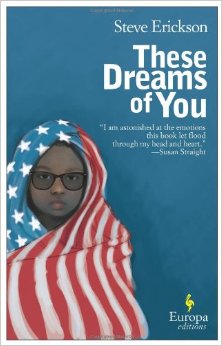
Steve Erickson, These Dreams of You
For all its close and intimate focus, These Dreams of You may well be today’s Great American Novel. Not just for its portraiture of universal American dreams and anxieties; not for its social scope; nor for its historical and political topicality, in which it deals in spades, but rather because of its painful sincerity, its humble recognition of human failings, and its continued hope that it is not too late.
–Pawel Frelik, Los Angeles Review of Books, 2012
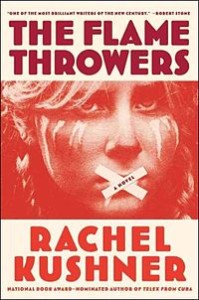
Rachel Kushner, The Flamethrowers
The Flamethrowers is mold-breaking, not only because it is written by a woman but also because its central character is a woman. In the books most often cited as candidates for the Great American Novel, male characters—Jay Gatsby, Huckleberry Finn, Ahab—have played that role, representatives, presumably, of the American experience. But (and do I really even need to say it at this stage?), the notion that a female figure might serve the same purpose undermines the very concept of the Great American Novel. Men are allowed to stand for the entirety of a national identity or for humanity itself, but women are only supposed to stand for womanhood, if in various flavors.
This is not to say that Kushner overtly presents Reno as the quintessential American, although the character’s trajectory is as aspirational in its own way as Gatsby’s and she seeks a rupture with the past as decisive as Huck’s (even if she lights out in the opposite geographical direction). In fact, Reno’s problems are very much a young woman’s problems. She is in danger of coasting on her physical allure and prone to attaching herself to decisive men in order to obtain the forward momentum she professes to crave. Taking a job at a film lab, she poses as a “China girl” on film leaders, one among any number of female faces whose skin tones provide a base line for color correction by technicians, “real but unreachable women who left no sense of who they were.” It’s the worst form of a representative identity: both generic and anonymous, a means to an end, an everywoman who is nobody.
–Laura Miller, Salon, 2013
So now, to this not exhaustive but certainly long list, I say: what about Hanya Yanagihara’s A Little Life? What about Jennifer Egan’s A Visit From the Goon Squad? Chimamanda Ngozi Adichie’s Americanah (who says you have to actually be American to write a Great American Novel)? Ben Lerner’s 10:04? Louise Erdrich’s Love Medicine? Sylvia Plath’s The Bell Jar (what if her protagonist were a man)? Katherine Dunn’s Geek Love? Surely all of these give the reader a “picture of the ordinary emotions and manners of American existence”—all depending on what your idea of “ordinary” is, of course. But maybe the fact that there is no ordinary in this country is exactly why the GAN continues to elude, perplex, and enchant the American writer.
Emily Temple
Emily Temple is the managing editor at Lit Hub. Her first novel, The Lightness, was published by William Morrow/HarperCollins in June 2020. You can buy it here.









